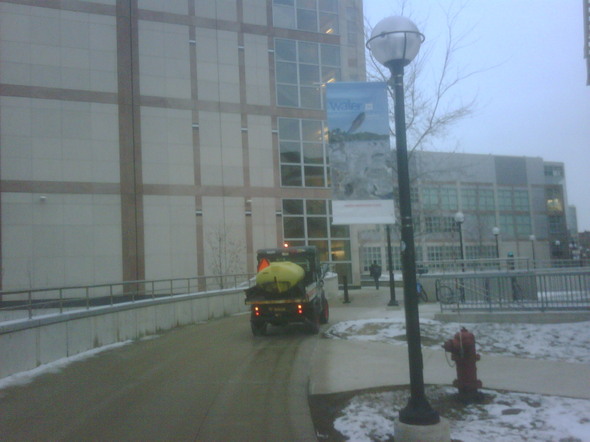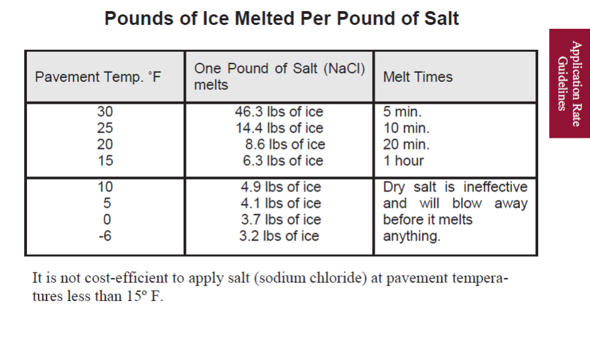Salt, snow, and road maintenance policies around Washtenaw County
The current snowstorm is giving area residents a salty reminder of what it's like to be in Michigan in the winter. Here's a roundup of area snow removal and road maintenance policies, so that you know what to expect from your area's road crews during the winter.

A truck sprays brine on a sidewalk near the Life Sciences Center at the University of Michigan this morning, several hours before the snow started to fall on campus.
Edward Vielmetti | AnnArbor.com
Road maintenance policies
Every road crew has a set of standard operating procedures, set out at the beginning of the season with a goal to provide the best available road clearing within the budget set for the year. Road clearing costs vary with the intensity of the winter, and every year's planning process faces uncertainty.
The University of Michigan winter maintenance policies focus on sidewalk clearing, with a Salt Use Improvement Team that has been in place since 1995 looking at alternative products and policies to minimize costs and improve the quality of work. Plans include spraying brine on sidewalks in advance of the storm.
The City of Ann Arbor winter maintenance procedures (PDF, 6 pages) spells out the procedures for dealing with 98 miles of major city streets that get priority treatment in storms. From 200 to 500 tons of road salt are needed to deal with a snowstorm, and an additional 200 tons of sand are used on secondary streets.
The City of Ypsilanti snow removal policy also spells out a priority list for roads, with state trunklines and major streets getting first treatment and residential streets and alleys coming last.
The Washtenaw County Road Commission is responsible for county roads as well as for maintenance of freeways and other state highways. About a quarter of its snow removal budget of $2 million is dedicated to trunk lines and is paid for by the State of Michigan.
During the December 2010 storm, the county's policy of minimal overnight maintenance was made evident. From their policy page:
G. Night Patrol will begin late November 2010 and continue through approximately mid-March 2011. Night Patrol consists of a four-person crew that is on duty from 8:00 p.m. until 4:30 a.m., five days a week, and responds to ice and snow conditions on State Trunklines. This crew is funded in total by the Michigan Department of Transportation. In isolated cases, the crew can perform winter maintenance on County roads, at the Road Commission’s expense.
County roads were particularly treacherous in the evenings, with the continued storm, cold temperatures that interfered with the usefulness of salt, and icy conditions contributing to dozens of accidents on county roads. It was a good night to stay home, if that option was available to you.
How much salt does it take to clear the roads?
It depends. The colder it is, the less effective that salt (sodium chloride) is at melting the snow; or, to put it another way, the more pounds of salt you need to melt the same amount of snow-covered pavement. It takes more than 6 times as much salt to melt ice at 15 degrees than it does at 30 degrees, and it takes a lot longer.

Chart courtesy of McHenry County Snow and Ice Control Manual
Is there anything else that works better?
Rock salt is only one of several chemicals that are used for snow melting. Other salts, including calcium chloride, magnesium chloride, and potassium chloride, are mixed in to products, especially products designed for consumer use for clearing sidewalks.
All salts are corrosive and harmful in some way to vegetation and concrete. Magnesium chloride is toxic to trees, notes this Colorado State Extension fact sheet on the topic. Many consumer products contain a mix of melting agents; check the label before you buy, and use the minimum amount necessary.
A novel approach to snow melting is to spread agricultural byproducts on the road. Frankenmuth, Michigan used a mix of salt and sugar beet juice in the 2007-2008 winter, and the product is available commercially in Illinois.
Edward Vielmetti writes about snow for AnnArbor.com. Email him at EdwardVielmetti@annarbor.com.


Comments
jj
Wed, Jan 12, 2011 : 2:26 p.m.
So in other words, if you live/work in Washtenaw County, you're on your own, as evidenced last night. But when you cross Rawsonville Rd (County Line) into Wayne County, the difference is glaring.